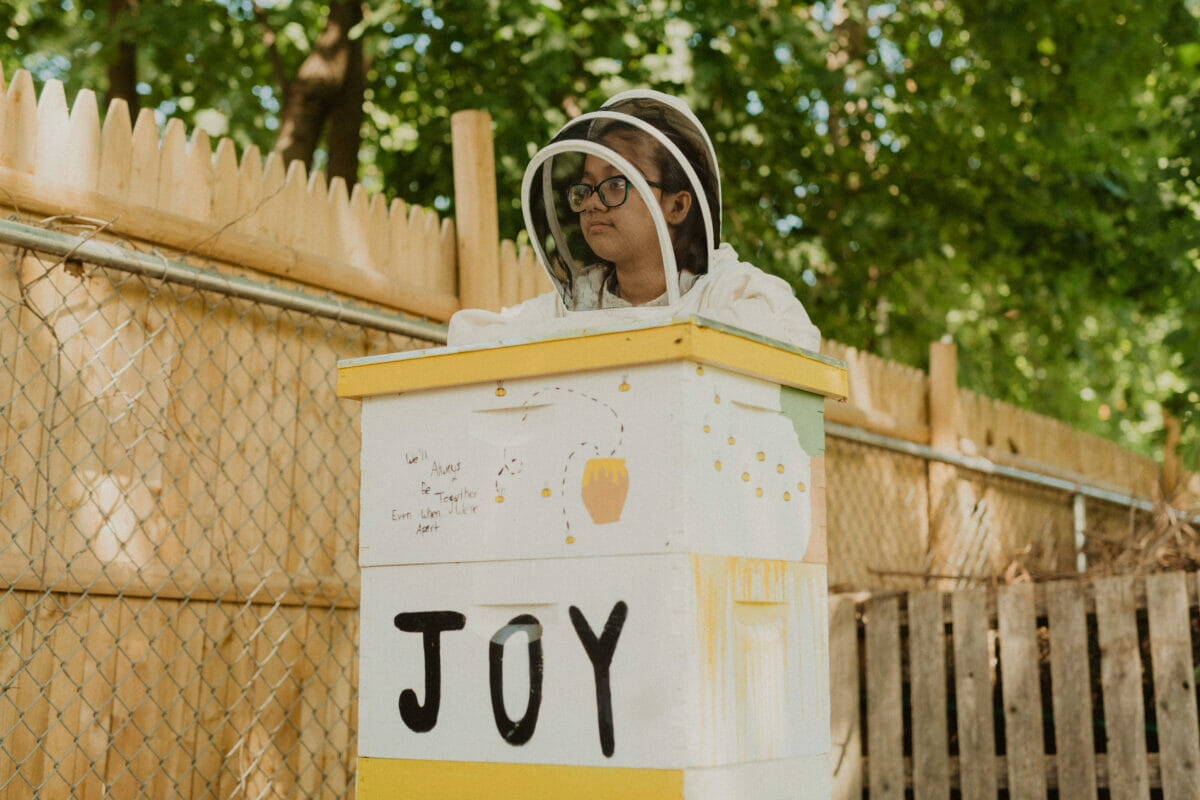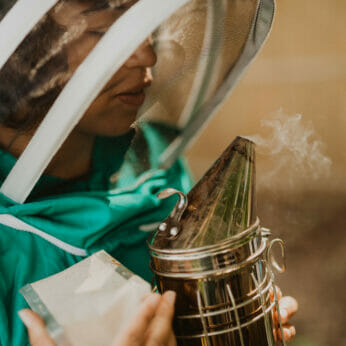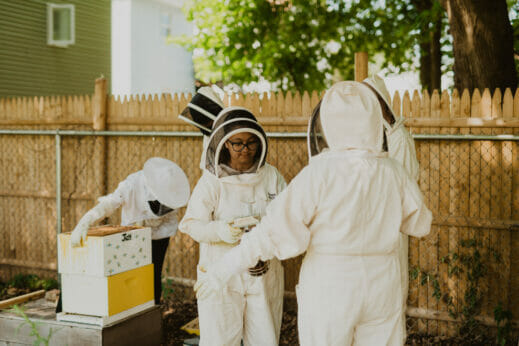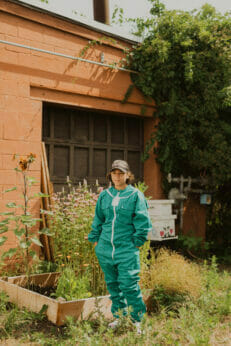For These Teens, a Unique Beekeeping Program Teaches About Much More Than Honey
In New Haven, Connecticut, the Huneebee Project is connecting youth with job skills, nature, and themselves.
For These Teens, a Unique Beekeeping Program Teaches About Much More Than Honey
In New Haven, Connecticut, the Huneebee Project is connecting youth with job skills, nature, and themselves.

Since 2018, the Huneebee project has graduated 25 students from its therapeutic job training program.by Grey Kenna.
Spending 15 weeks surrounded by bees wasn’t Maria Roman’s plan for the summer. The New Haven, Connecticut-based teenager was going through a lot when a family friend suggested she participate in the Huneebee Project, a beekeeper-in-residence program that offers young people the chance to interact with bees while learning essential life skills.
Roman had recently entered the foster care system and found herself drifting away from things she once loved, such as spending time outside. She recalls thinking, “You seriously want me to be around bees? Definitely not.”
With no prior pollinator experience, Roman was apprehensive. “I knew they stung and to get away from them if they’re close to you.” But by her fifth week in the program, Roman had warmed up to the bees, finding them therapeutic.
“The sound of the bees is really relaxing,” says Roman. “It’s calming.”

Started by clinical social worker Sarah Taylor in 2018, the Huneebee Project is a therapeutic job skills training program that has graduated 25 cohorts, including Roman, from the 15-week program over the past five years. It’s also installed roughly 30 honey bee colonies across seven sites in the greater New Haven area, planted pollinator-friendly garden plots and launched an online marketplace that sells honey made from the hives, candles and a curated selection of other artisan products.
Participants range in age from 15 to 23, and the project prioritizes enrolling children and young adults with past or present child protective and foster care involvement.
Taylor had long dreamed of creating a nonprofit for youth who are aging out of the foster care system. But it wasn’t until she took time for herself that she realized the therapeutic potential of beekeeping. Burnt out and disheartened with the foster care and child protective services systems, Taylor started keeping her own bees while working and attending a fellowship program in New Haven.
“After a day of work, the only place I wanted to be was with my bees,” says Taylor. “It became a meditative practice for me. They’re their own form of therapy.”
The Huneebee Project became Taylor’s opportunity to combine her love of beekeeping with her professional background.
The students are responsible for about 30 hives, although they are working on expanding to 50 hives by the end of summer 2023 across seven official garden sites in New Haven neighborhoods where the youth live. They also now have community hive checks where locals can join in checking on and learning about bees. It’s one more place to create a network and sense of community for the teens and the bees.
“It was really important to have the gardens where youth live so they would be accessible and create spaces where they can have a sense of ownership,” says Taylor.

Over the years, the programming has evolved as participating youth have given feedback. The program runs each summer and is purposefully small, with about six students taking part. The students must attend at least 75 percent of the workshops to graduate and are matched with a mentor who provides encouragement throughout the program and helps with practicalities such as transportation and breakfast.
“These are kids that are often not going to school or are struggling to get out of bed or are extremely socially anxious. The mentors encourage them, they help with transportation and even get them something to eat. The intensive individual attention is so important,” says Taylor.
Students don’t even get into a bee suit for the first weeks; instead, according to Taylor, they spend time forming relationships, understanding their feelings and their body’s responses to emotions, such as fear, and identifying what they need to regain a sense of control.
“We have these 15-, 16-year-olds who are used to pretending to be tough, but it’s hard to pretend to be tough around the bees, and it allows for more authentic conversations around fear,” says Taylor. “When someone with a trauma history has that fear response activated but can regain a sense of control, I believe that is healing.”
Since starting the project, Taylor has watched students heal, graduate with professional skills they take with them to college or new jobs and blossom.
For Alex Guzman, who graduated from the program in 2019 and continues to work at the Huneebee Project as junior bee instructor while attending college, the experience helped teach her skills she continues to use today.
“I’ve learned how to socialize in a more professional setting, and I’ve also gathered a lot more patience,” says Guzman. “I have been handling my mental health, learning when to set a boundary or take a break when I need to and take a breather.”

They’re skills she’s learned from interacting with others in the program and the bees themselves.
“You have to be really patient when you approach bees and to take your time,” says Guzman, “kind of like when you’re dealing with any living thing. Everything I’ve been doing with the bees has contributed to developing those [socialization and patience] skills.”
Students also learn practical office skills, such as using a printer or a coffee maker, that are easy to take for granted but intimidating if you’ve never used them.
“I look at myself now and, sometimes, I feel like I’m ready to be a boss,” says Roman, who adds that she would someday like to have her own house with bees that she could take care of and eventually, if she has children, teach her kids about.
Follow us
This work is licensed under a Creative Commons Attribution-NoDerivatives 4.0 International License.
Want to republish a Modern Farmer story?
We are happy for Modern Farmer stories to be shared, and encourage you to republish our articles for your audience. When doing so, we ask that you follow these guidelines:
Please credit us and our writers
For the author byline, please use “Author Name, Modern Farmer.” At the top of our stories, if on the web, please include this text and link: “This story was originally published by Modern Farmer.”
Please make sure to include a link back to either our home page or the article URL.
At the bottom of the story, please include the following text:
“Modern Farmer is a nonprofit initiative dedicated to raising awareness and catalyzing action at the intersection of food, agriculture, and society. Read more at <link>Modern Farmer</link>.”
Use our widget
We’d like to be able to track our stories, so we ask that if you republish our content, you do so using our widget (located on the left hand side of the article). The HTML code has a built-in tracker that tells us the data and domain where the story was published, as well as view counts.
Check the image requirements
It’s your responsibility to confirm you're licensed to republish images in our articles. Some images, such as those from commercial providers, don't allow their images to be republished without permission or payment. Copyright terms are generally listed in the image caption and attribution. You are welcome to omit our images or substitute with your own. Charts and interactive graphics follow the same rules.
Don’t change too much. Or, ask us first.
Articles must be republished in their entirety. It’s okay to change references to time (“today” to “yesterday”) or location (“Iowa City, IA” to “here”). But please keep everything else the same.
If you feel strongly that a more material edit needs to be made, get in touch with us at [email protected]. We’re happy to discuss it with the original author, but we must have prior approval for changes before publication.
Special cases
Extracts. You may run the first few lines or paragraphs of the article and then say: “Read the full article at Modern Farmer” with a link back to the original article.
Quotes. You may quote authors provided you include a link back to the article URL.
Translations. These require writer approval. To inquire about translation of a Modern Farmer article, contact us at [email protected]
Signed consent / copyright release forms. These are not required, provided you are following these guidelines.
Print. Articles can be republished in print under these same rules, with the exception that you do not need to include the links.
Tag us
When sharing the story on social media, please tag us using the following: - Twitter (@ModFarm) - Facebook (@ModernFarmerMedia) - Instagram (@modfarm)
Use our content respectfully
Modern Farmer is a nonprofit and as such we share our content for free and in good faith in order to reach new audiences. Respectfully,
No selling ads against our stories. It’s okay to put our stories on pages with ads.
Don’t republish our material wholesale, or automatically; you need to select stories to be republished individually.
You have no rights to sell, license, syndicate, or otherwise represent yourself as the authorized owner of our material to any third parties. This means that you cannot actively publish or submit our work for syndication to third party platforms or apps like Apple News or Google News. We understand that publishers cannot fully control when certain third parties automatically summarize or crawl content from publishers’ own sites.
Keep in touch
We want to hear from you if you love Modern Farmer content, have a collaboration idea, or anything else to share. As a nonprofit outlet, we work in service of our community and are always open to comments, feedback, and ideas. Contact us at [email protected].by Bridget Shirvell, Modern Farmer
June 1, 2023
Modern Farmer Weekly
Solutions Hub
Innovations, ideas and inspiration. Actionable solutions for a resilient food system.
ExploreExplore other topics
Share With Us
We want to hear from Modern Farmer readers who have thoughtful commentary, actionable solutions, or helpful ideas to share.
SubmitNecessary cookies are absolutely essential for the website to function properly. This category only includes cookies that ensures basic functionalities and security features of the website. These cookies do not store any personal information.
Any cookies that may not be particularly necessary for the website to function and are used specifically to collect user personal data via analytics, ads, other embedded contents are termed as non-necessary cookies.
Sounds good, hope it will happen in more places. We need all the honeybees possible.
I’m interested in bee’s,